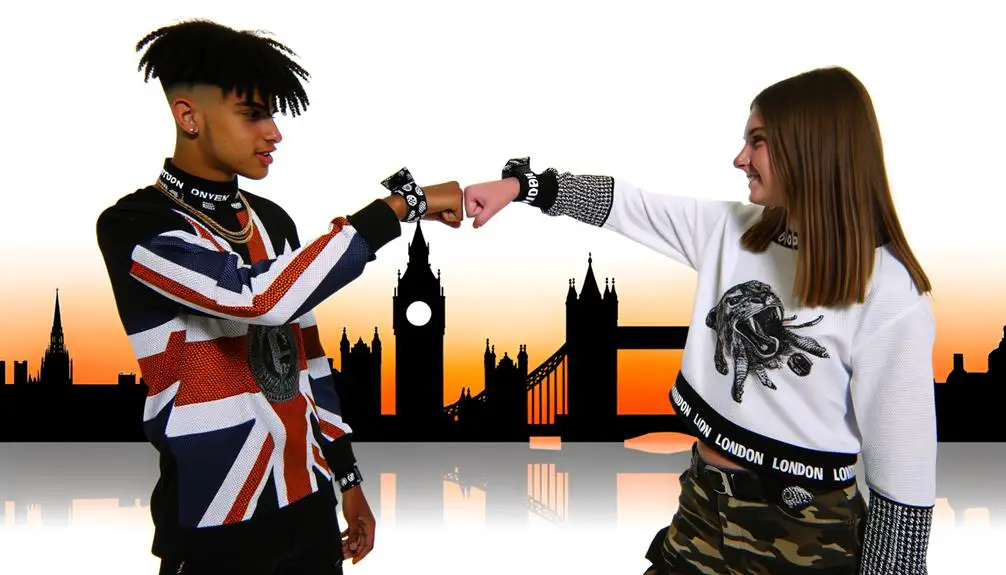So, you've stumbled into the vibrant world of British slang and heard the term 'blud' thrown around like a football in the park, huh? Originally hailing from Caribbean English, 'blud' found its way into the UK's heart, evoking a sense of familial bond deeper than your average 'mate'. It's not just any word; it's a badge of camaraderie, signaling trust and a close-knit connection. Whether you're meandering through London's bustling streets or scrolling through your social feed, 'blud' captures the essence of urban solidarity. And guess what? There's a whole lot more flavor and history behind this word just waiting to spice up your lingo.
Key Takeaways
- 'Blud' in British slang originated from Caribbean English, implying familial ties and deep connections.
- It signifies camaraderie and friendship, often used among close friends to signal trust and unity.
- The term has evolved through cultural fusion, especially within London's urban scenes and UK music.
- 'Blud' is commonly used in greetings, expressions of disbelief, and seeking affirmation in everyday language.
- Its usage reflects an urban edge and is part of the evolving street culture, distinguishing it from more traditional terms like 'mate'.
Origin of Blud
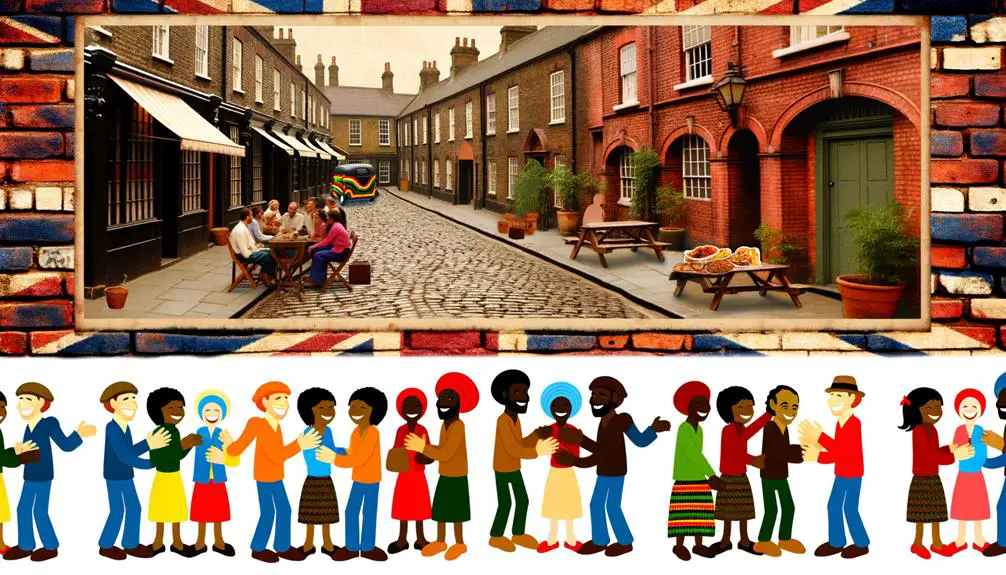
Diving into the origins of 'blud,' you'll find it's deeply rooted in Caribbean English, making its way into British slang with a cool, unmistakable vibe. This term, a staple in the linguistic wardrobe of many, didn't just pop up overnight. It's got history, mate. Originating from the word 'blood,' which you might guess implies familial ties, it's morphed into a term of endearment among friends, not just relatives.
You're probably wondering how this Caribbean gem sailed across the oceans to nestle itself into the heart of British vernacular. Well, it's all down to the global spread, a demonstration to the power of cultural fusion. As people from the Caribbean migrated to the UK, they brought with them a treasure trove of linguistic jewels, 'blud' being one of the shiniest.
This global journey of 'blud' from a term signifying blood relations to a casual, friendly address among pals in the UK is a fascinating tale of linguistic evolution. The term's ability to adapt and thrive in new environments showcases the dynamic nature of language, constantly shaped by cultural interchanges. So, next time you hear someone say 'blud,' you'll know it's more than just slang; it's a linguistic globetrotter.
Blud in Popular Culture
Alright, you've probably heard "blud" dropped in beats and banter, but ever wonder how it seeped into our tunes and telly? From grime tracks to gritty dramas, this slang's not just hanging about, it's shaping vibes and dialogues. So, let's see how "blud" went from street talk to screen gold, influencing both the music scene and TV and film in ways you might not have clocked.
Music Scene Influence
Influencing the beats and bars of the music world, 'blud' has become a staple in lyrics that resonate with urban vibes and brotherhood. It's like the secret handshake of the British music scene, especially with the grime influence. You've probably heard it dropped in tracks that blast through the speakers of underground events, where the air vibrates with bass and camaraderie. Artists weave 'blud' into their rhymes like a badge of authenticity, a nod to their roots and the streets that raised them. It's more than just a word; it's a lifestyle, a connection that runs deep in the veins of the UK's music culture. So next time you're nodding along to a grime beat, listen out for 'blud' – it's the heartbeat of the scene.
TV and Film Usage
Have you noticed how 'blud' pops up in your favorite British shows and films, making the dialogue snap with authenticity and edge? It's not just thrown in there for kicks, mate. This term's got some serious street cred, and its usage is a clever nod from screenwriters keen on nailing character analysis. They're tapping into the heart of urban lingo, giving characters a layer of realism you can't get from a posh accent alone. Scriptwriting trends are all about mirroring real life, and slipping 'blud' into conversations does just that. It's like a secret handshake for those in the know, making you nod along, thinking, "Yeah, this is how people really talk." So, next time you hear it, tip your hat to the writers; they've done their homework.
The Evolution of Blud
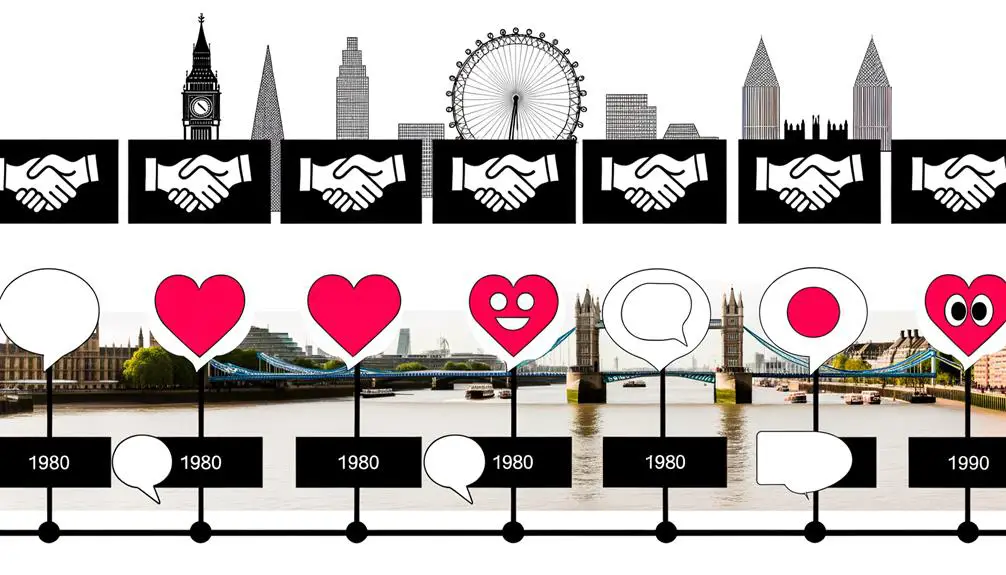
Over the years, 'blud' has morphed from simple brotherhood lingo to a staple in everyday British slang, showcasing the fluid nature of language itself. Initially, you might've thought it was just another urban vernacular, but blud's journey from the streets of London to international adoption is nothing short of fascinating. Its phonetics are catchy, making it a beloved export in conversations far beyond the British Isles. Here's a quick look at how 'blud' has evolved and made its mark globally:
| Era | Description | Impact |
|---|---|---|
| 1990s | Emergence in London's urban scenes | Localized use |
| Early 2000s | Spread through UK music | Nationwide recognition |
| Mid-2000s | Featured in British films/TV | Cultural staple |
| 2010s | International adoption via social media | Global slang |
| 2020s | Online platforms amplify usage | Universal camaraderie term |
Blud's phonetics played a huge part in its allure, offering a unique sound that's both endearing and powerful. It's a reflection of how language evolves and adapts, influenced by culture, technology, and social interaction. So next time you hear someone say 'blud', remember, you're witnessing the living, breathing dynamics of contemporary slang.
Blud Vs. Mate
Diving into the world of British slang, you'll quickly spot the friendly rivalry between 'blud' and 'mate', each packing its own punch in camaraderie terms. While 'mate' is as British as a cuppa tea, 'blud' brings a fresh vibe, often associated with urban and street culture. But let's break it down, shall we?
- Pronunciation and Vibe: Say "blud" (rhymes with "flood"), and you're instantly cooler. It's got that urban edge, whereas "mate" is more universally cozy and familiar. Picture "blud" as the leather jacket to "mate's" comfy sweater.
- Cultural Tapestry: Blud has roots in Caribbean English, giving it a rich, international flavor. It's the linguistic equivalent of a world tour, from London streets to tropical beats.
- International Cousins: Speaking of international equivalents, "blud" finds its kin in "bro" from the US, "compa" in Mexico, and even "bruv," its own British sibling. Each term crafts a sense of brotherhood, but with its own local flair.
Usage in Everyday Language

You've probably heard "blud" tossed around in conversations or across social media and wondered how it slots into everyday chit-chat, right? Well, it's not just a random word; it's a signal of camaraderie, weaving itself into common expressions and showing a tight bond similar to friendship. So, next time you hear someone address their mate as "blud," you're in on the secret – it's all about that deep connection.
Common Expressions
Let's get straight to it – when you're chatting with mates in the UK, you'll likely hear 'blud' thrown into the convo more often than not. This term has woven its way into the fabric of British slang, serving as a proof to the ever-evolving nature of language. Here's how 'blud' spices up everyday lingo:
- Greeting a friend: 'Oi, blud! How's it hanging?' It's a casual, yet endearing way to say hello, underscoring the informal greeting norms among close pals.
- Expressing disbelief: 'You're joking, blud!' This phrase captures the moment of surprise or shock, all the while maintaining that vibe of familiarity.
- Seeking affirmation: 'Isn't that right, blud?' It's like asking for a nod of agreement, reinforcing those invisible family ties within a circle of friends.
Friendship Indication
In the world of British slang, dropping a 'blud' in your chat's a surefire sign you're in the inner circle. It's like the secret handshake of verbal communication, a nod to the fact that you're more than just acquaintances; you're part of the domain. This isn't just any old word—it's a cornerstone of bonding rituals that cements your status as a trusted confidant. Throwing 'blud' into a conversation is akin to trust building on steroids. It's a signal that you've moved beyond formalities and into the domain of genuine friendship. So, next time someone calls you 'blud,' take it as a compliment. You've officially been welcomed into the fold, mate.
Regional Variations
While 'blud' might sound like a universal term across the UK, its flavor and usage actually vary quite a bit from one region to another. This isn't just about who's saying it, but how they're spinning it, thanks to the quirks of dialectical pronunciation and slang interchangeability. Let's paint a picture of how 'blud' morphs as you trot from one British locale to another:
- In London: 'Blud' is as common as rain on a bank holiday. Here, it's the glue in conversations among friends, often pronounced with a sharp, quick delivery that matches the city's pace. It's all about camaraderie in the Big Smoke.
- In the West Midlands: You might hear it stretched out a bit more, with a softer touch, reflecting the region's mellower vibe. The term weaves through chats more like a melody, showing that warmth in speech isn't just reserved for the weather.
- In Glasgow: The term might not dominate the scene, but when it's used, it's got a distinct twang, infused with a Scottish lilt that adds a whole new layer of character. It's ‘blud' with a tartan twist, proving that even slang can wear local colors.
Each variation tells you a little story about the place and its people, making 'blud' a linguistic chameleon that's always ready to adapt.
Blud in Social Media
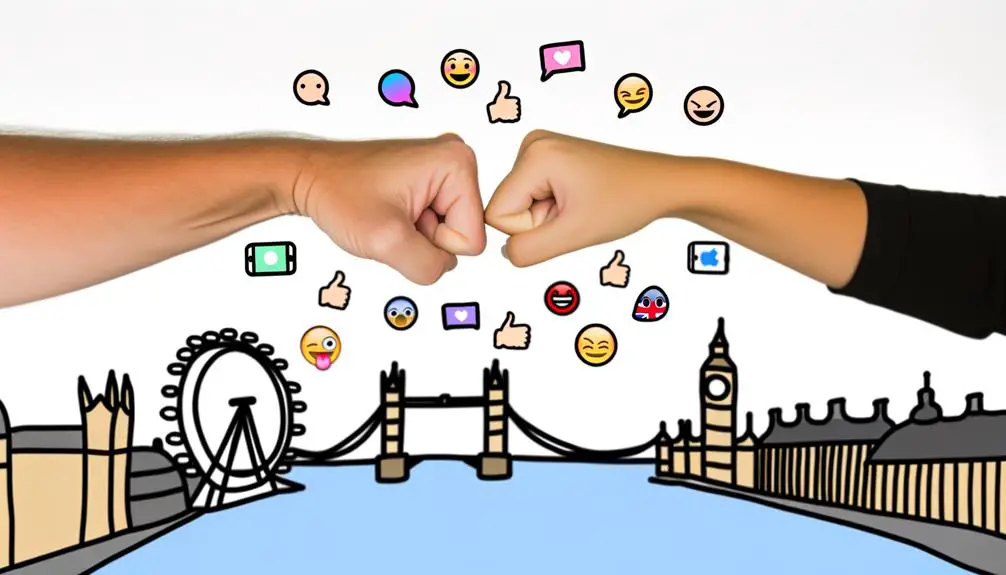
You've likely seen 'blud' pop up all over your social feeds, morphing digital chit-chats into virtual street corners. It's the cool kid on the block, sliding into tweets, comments, and captions, giving off vibes of camaraderie and streetwise solidarity. But here's the rub: not everyone's clued up on this linguistic handshake. Cue the potential for online misunderstandings faster than you can say "lost in translation."
Navigating social media etiquette with 'blud' in your vocab arsenal can be like walking a tightrope over a pool of sharks—exciting but risky. Drop a 'blud' in the wrong chat, and you might find yourself drowning in a sea of confusion, with followers scratching their heads or, worse, taking offense. It's all about reading the room—or, in this case, the virtual room.
Understanding when and where to sprinkle 'blud' into your online interactions is key. It's a term that bonds, that brings a touch of urban cool to your digital persona, but wield it wisely. Not everyone gets it, and not every situation calls for its use. Like all slang, its power lies in its timing and context, making the difference between a social media win and a faux pas.
Expressing Solidarity With Blud
Throwing 'blud' into your chat's like wrapping your words in a fist bump, signaling you're all in this together. It's not just slang; it's a secret handshake in the airwaves, a nod to the unbreakable bonds you've formed. When you call someone 'blud', you're not just tossing out a casual term; you're weaving them into your circle, making them family. It's about personal bonding on a level that's deeper than just mates hanging out.
To bring this to life, imagine:
- The Late-Night Kebab Run: You and your blud, sharing a laugh and a greasy meal after a night out. It's not just food; it's an unspoken pact of enduring friendship.
- Back-to-Back in a FIFA Marathon: Controllers in hand, you're not just playing a game; you're in the trenches together, building camaraderie through every virtual goal scored.
- That Emergency Phone Call: Whether it's 3 a.m. or the middle of a busy day, this is when 'blud' proves its worth. It's knowing someone has your back unconditionally.
These aren't just moments; they're blud rituals, the essence of personal bonding that defines the term.
Misconceptions About Blud
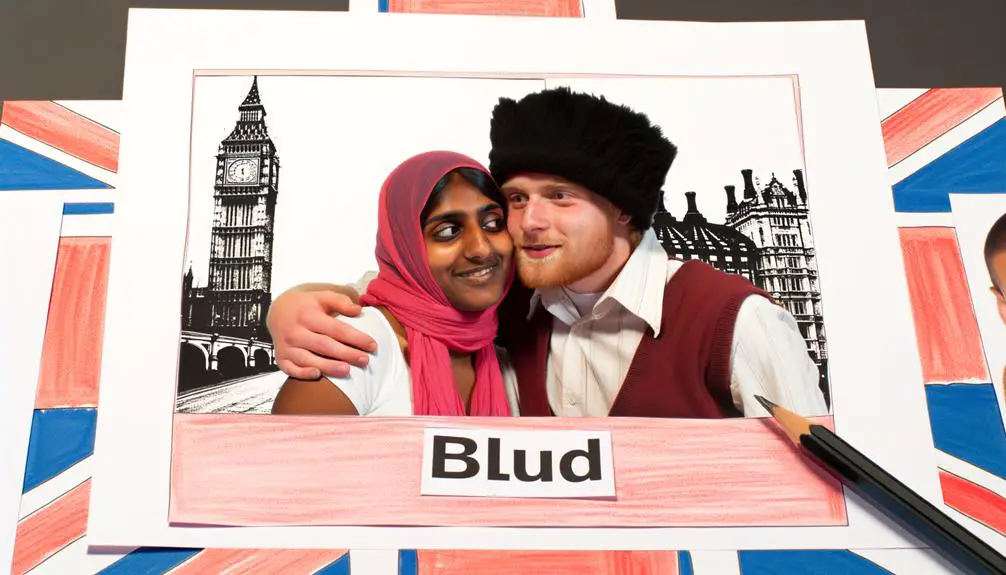
Despite its deep roots in camaraderie, there's a heap of myths about 'blud' that need clearing up. You might've heard it thrown around and figured it's just another word for friend, but oh, it's more nuanced than that. Some reckon it's too informal, too street, but that's missing the point. It's about bond, not just casual chit-chat.
Then there's the whole linguistic accuracy debate. Look, 'blud' isn't trying to muscle its way into the Oxford English Dictionary as the next 'thou' or 'thee.' It's slang, through and through, but that doesn't strip it of meaning or importance. The way it weaves into conversations is more art than science, a sign of its flexibility and the creativity of those who sling it around.
And about slang formalization – let's not get ahead of ourselves. 'Blud' thrives in its natural habitat: spontaneous, evolving conversations. Trying to pin it down or sanitize it for broader acceptance? That misses the whole vibe. It's like trying to explain a joke; if you have to dissect it, you've lost the spark.
The Future of Blud
As we look ahead, it's clear that 'blud' isn't going anywhere, evolving with each generation that takes it on. What started as a term deeply rooted in British urban culture has now found its wings, thanks to the global spread and the internet's knack for turning local lingo into worldwide slang. But where does 'blud' go from here? Let's break it down:
- Global Spread: Imagine 'blud' popping up in conversations from Tokyo to Toronto, each time with a little twist that makes it uniquely local. The word's versatility and easy-to-pick-up vibe mean it's only going to get more popular across the globe.
- Linguistic Adaptation: Picture 'blud' morphing into new forms. Maybe in the future, we'll have 'bluddy', a term of endearment for the closest of friends, or 'blud-up', a call to unite or come together.
- Cultural Integration: Visualize 'blud' in movies, music, and memes, further cementing its status as a word that's here to stay. It's not just slang; it's a cultural marker, evolving with society's shifts and changes.

